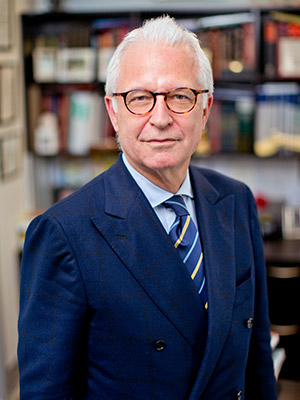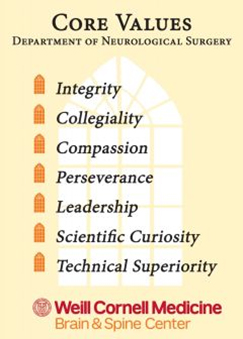When world-renowned neurosurgeon Philip Stieg, PhD, MD, was recruited to establish the Department of Neurological Surgery at NewYork-Presbyterian/Weill Cornell Medicine in 2000, he viewed the new department as a diamond in the rough—a place where he could make his mark.
Dr. Philip Stieg, PhD, MD, Chairman and Neurosurgeon-in-Chief at Weill Cornell Medicine
The appointment was an opportunity to rethink resident training and establish new professional standards. “I wanted the residency program to be rigorous, meaning that I believe that becoming a neurosurgeon is a little bit like becoming a Navy SEAL,” he says. “What we do is hard. But you also have to be human.”
To help meld the concepts of expertise and humanity, Dr. Stieg established seven pillars that would infuse and ultimately define the department’s operation both clinically and culturally: integrity, collegiality, compassion, perseverance, leadership, scientific curiosity, and technical superiority.
“I felt that I had to give everybody some principles by which they knew I stood strongly and would be unwilling to violate,” Dr. Stieg says. “Not everybody's going to achieve great things in every one of these, but these are the core competencies that everybody in our group has to have.” The seven core principles are now embedded in the department’s DNA and have expanded beyond the institution’s walls.
“The thing that I'm most proud of is emphasizing the importance of emotional IQ,” says Dr. Stieg. “That was nonexistent in the development of neurosurgery. When I started, a compassionate neurosurgeon was a rare breed.”
Yet that combination of excellence and empathy in the field is paramount for the patient. “Every day, we're going into somebody's brain or their spine, which carries the risk of altering the quality of their life, if not their existence,” says Dr. Stieg. “You would have to be inhuman not to feel some level of anxiety or trepidation. There's this sense of awe and respect that one has to have.”
A Legacy of Leadership
Merging surgical rigor with more humanistic qualities has been a successful strategy for Dr. Stieg, Neurosurgeon-in-Chief of NewYork-Presbyterian/Weill Cornell Medicine and the Margaret and Robert J. Hariri Professor of Neurological Surgery and Vice Provost for Strategic Initiatives at Weill Cornell Medical College. “In my 22 years here, we’ve trained dozens of residents, the vast majority of whom have gone on to prestigious academic positions around the country,” he says. “Our graduates are leading the way into the future of neurosurgery.”
But transforming neurosurgical resident education is not the only groundbreaking accomplishment of Dr. Stieg’s storied career. He has also developed new approaches to patient care. He expanded the concept of a neurosurgery department into the Weill Cornell Medicine Brain and Spine Center, an interdisciplinary clinic that brings together neurosurgeons, endocrinologists, neuropsychologists, neuro-oncologists and other specialists to care for patients with complex needs.
Similarly Dr. Stieg spearheaded the creation of the Neurosurgical Innovations and Training Center for Skull Base and Microneurosurgery (the first global multimedia neurosurgical teaching facility), New York’s first multidisciplinary Concussion and Brain Injury Clinic staffed by neuro-specialists, and the Weill Cornell Medicine Center for Comprehensive Spine Care, which is now part of Och Spine at NewYork-Presbyterian, where patients receive multidisciplinary services under one roof.

Dr. Stieg—whose expertise is in cerebrovascular disorders, skull base surgery, and traumatic brain injury—has been on the forefront of new technologies and has played key roles in the thought processes on the management of cerebrovascular disease. He also has been a leader in promoting the advancement of endovascular skill sets, focused ultrasound—a game changer for essential tremor—and stem cell therapy, which he investigated as a fellow at Sweden’s Karolinska Institute.
“I've always been fascinated by stem cells,” says Dr. Stieg. “And I'm optimistic that we are going to be able to apply stem cell therapy to select disease processes.”
Empowering Patients
Dr. Stieg is as passionate about educating patients and counteracting medical misinformation as he is in educating fellow physicians and advancing emerging technologies. “There's a considerable amount of bad information out there,” he says. “If you talk to doctors, they will tell you that the first 10 minutes of their patient contact is disavowing the misinformation that they've gotten.
”Dr. Stieg created and hosted the NPR radio show “How to Save Your Life,” to help stem that tide and in 2019 started the popular podcast “This Is Your Brain With Dr. Phil Stieg,” which explores a wide range of topics related to brain and mind. He also hosts a condition-focused webinar series by the same name, racking up thousands of views on YouTube. “The focus of the webinar is to educate patients and teach them how to be better patients,” he says. “I believe every patient needs to ask ‘What do I have? What does it mean to have it? What can I do about it? And what are the risks?’’’
“We’re trying to educate people about what they should know about different diseases and problems,” says Dr. Stieg. “But I also try to get them to focus on what they can do to avoid those disease states. So much of disease is behavioral.
”For instance, Alzheimer's doesn’t begin in older age, Dr. Stieg says. “It's a process that starts when you're 30 and there are things that you probably can do to avoid or delay the onset of the disease,” he says.
He takes an even broader view of brain health and function in the podcast. “Almost everything is under the purview of the brain,” he says. He covers topics including sexual delight and dysfunction, sleep and dream states, how the brain processes and responds to music, and event he sources of rage.
In addition to thought pieces for the podcast, Dr. Stieg has interviewed experts in nutritional psychiatry and sleep disorders, just two of the areas where lifestyle approaches can make a substantial difference in a patient’s health. He sometimes “prescribes” particular podcasts to help patients understand what is happening to them and the role they have to play in their own healing.
Making a Difference
While Dr. Stieg finds fulfillment in each of his roles, whether it’s blazing new trails in patient education, transforming resident training or re-organizing the delivery of care, performing neurosurgery is what most gives his life meaning.
“I was raised in a Lutheran family, where the purpose of life was to give back and to help people,” he says. “That’s always been a personal drive of mine.”
Dr. Stieg recalls a patient who recently returned to the hospital to reunite with the team that had saved his life after a traumatic brain injury.
“This person was basically in a vegetative state, and now he's going to bars and doing karaoke,” says Dr. Stieg. “There's nothing more satisfying than taking away pain, removing a tumor and giving a person back their normal life — even if you only do it once in your lifetime. How many people get to say that they’ve significantly altered the life of one person? I hope that I’ve done it for 10,000.” He also hosts a condition-focused webinar series by the same name, racking up thousands of views on YouTube. “The focus of the webinar is to educate patients and teach them how to be better patients,” he says.
Dr. Stieg’s next venture should allow him to expand the idea much further. He is in talks to establish a streaming service like Netflix but with medical education content, accessible through an app anywhere in the world. “I’m putting together a group of people that will create good information,” he says.
One of the aims of the project is improving health equity. “Not everyone has access to top specialists, because they don’t take their insurance or other issues,” says Dr. Stieg. “But they could go on this platform and at least hear what the specialist has to say about their disease process.”






